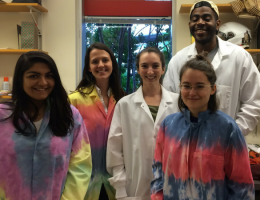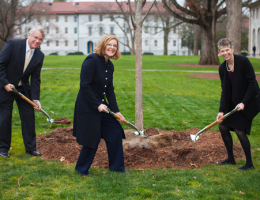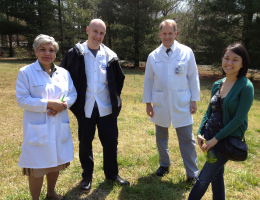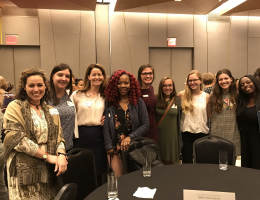For decades, Emory faculty and staff have worked to integrate sustainability into all aspects of campus life. Whether in the classroom, conference room, kitchen or lab, your leadership is integral to Emory’s progress on sustainability.
Acknowledging the ancestral peoples and land
Emory’s Office of Sustainability Initiatives acknowledges the Muscogee (Creek) people who lived, worked, produced knowledge on, and nurtured the land where Emory’s Oxford and Atlanta campuses are now located. The Muscogee people were forcibly removed from states like Georgia and Alabama during the Trail of Tears relocation (1830-1838), a shameful part of our history when the federal government forced Indigenous peoples across the region to leave their ancestral homes. In 1836, Emory University was founded on part of this land. It is important for us to acknowledge, honor, and respect the land we now call home; to further recognize the inherent intersections between Indigenous rights, sustainability, and the environment; and to continue to strive for justice and recognition for Indigenous communities.
Read Emory’s official Land Acknowledgement and learn more here.
TAKE ACTION
- Bring sustainability into your classroom: the Piedmont Project energizes faculty from across disciplines to support integrating sustainability into cross-curricular learning.
- Learn how to make your work spaces more sustainable through the Green Offices and Green Labs programs.
- Make all of your events zero landfill waste and Certified Sustainable Events.
- Take your personal sustainability pledge to learn how you can positively impact the world for current and future generations.
- Have an idea for sustainability innovation on campus? Apply for annual funding opportunities.
- Get to know your building’s Sustainability Representative, become a trained Zero Waste Ambassador and explore ways to volunteer or get involved with sustainability at Emory.
KEEP IT SUSTAINABLE
- Learn how to recycle and reuse at Emory, and do your part to help us achieve zero landfill waste.
- Incorporate local and sustainable food into your diet by volunteering in an Emory Educational Garden and shopping at the Emory Farmers Market.
- Save money and improve your quality of life by switching to a sustainable commute mode, taking a shuttle or bicycling to and from campus.
LEARN MORE
- Read the Emory Sustainability Vision and Strategic Plan, and see our progress.
- Tap into the sense of place that comes with being a part of the Emory community.
- Sign up for the Office of Sustainability e-newsletter; follow us on Facebook and Instagram
Resources and Opportunities to Continue the Legacy
| Title | Initiative | Type | Description |
|---|---|---|---|
| 2020 Annual Energy & Utilities Report | Buildings, Energy, Operations | Documents & Reports | A report on Emory's utilities and energy usage for 2020. Note that the COVID-19 pandemic has had impacts on energy and utilities usage. |
| 2023 Energy and Water Report | Buildings, Energy, Operations, Transportation, Water | Documents & Reports | Each year, Campus services produces an energy and water report describing Emory's progress against its goals to reduce its energy and water consumption. |
| Emory Climate Coalition Press Release – October 13, 2021 | Buildings, Climate Solutions, Energy, Purchasing, Transportation, Wellbeing | Documents & Reports | On October 13, 2021, student leaders of the Emory Climate Coalition (ECC) met with President Fenves to articulate their demand for greater University action to address the global climate emergency. The meeting resulted in President Fenves signing onto the Race to Zero and the Climate Leadership Network, two networks of higher education institutions committed to climate action. ECC is currently working with Emory decision-makers to move forward from baseline commitments to tangible action. |
| Emory’s 2023 Climate Action Plan | Climate Solutions | Documents & Reports | Emory's most recent climate action plan offers recommendations to guide Emory on its path to net neutrality by 2050. |
| Emory’s Climate Commitments: Summary and Implementation | Climate Solutions | Documents & Reports | This memorandum summarizes the commitments that Emory made in 2021, Emory’s history of implementation, the next steps for implementation, and relevant resources and contacts for each commitment. |
| Everything You Wanted to Know about Running an Ultra Low Temperature (ULT) Freezer Efficiently but Were Afraid to Ask… | Academics, Biodiversity & Landscape, Buildings, Climate Solutions, Energy, Waste, Water, Wellbeing | Documents & Reports | Everything You Wanted to Know about Running an Ultra Low Temperature (ULT) Freezer Efficiently but Were Afraid to Ask… |
| FY2021 Greenhouse Gas Emissions Inventory Full Report | Buildings, Climate Solutions, Energy, Transportation, Waste, Water | Documents & Reports | Emory regularly evaluates its greenhouse gas (GHG) emissions, or carbon footprint, in order to monitor its efforts to reduce emissions to net-zero by 2050 through strategies that entail targeted mitigation, behavior change, clean and renewable energy sources, and new innovations. GHG emissions reporting began in FY10, with 2005 as the original baseline year, and subsequent inventories have been conducted in 2013, 2014, 2016, 2019, and 2021. |
| Green Labs Certification Checklist | Climate Solutions, Energy, Purchasing, Transportation, Waste, Water | Forms | Learn what sustainable actions your lab can adopt, and tell us what you’re already doing, by filling out the Green Labs at Emory Checklist and consulting the companion Green Labs at Emory Guidance Document. |
| Green Labs Certification Guidance Document | Climate Solutions, Energy, Purchasing, Transportation, Waste, Water | Guides | Consulting this companion Green Labs at Emory Guidance Document when filling out your Green Labs Checklist for certification. This Guidance Document provides instruction for how to implement each action and justification for why each action is important. |
| Green Offices at Emory Certification Checklist | Buildings, Climate Solutions, Energy, Food & Dining, Purchasing, Transportation, Waste, Water | Forms | This document is only for your reference. Please fill out the Green Office checklist on Microsoft Forms. |
| How to Plan a Sustainable Event_OSI 2020 | Food & Dining, Waste | Documents & Reports, Guides | The Office of Sustainability Initiatives presented this at the 2020 Sustainable Events Symposium as a guide to planning sustainable events with plant-based catering. |
| How to Win the International Laboratory Freezer Challenge | All Initiatives | Documents & Reports, External Sites | How to win the International Laboratory Freezer Challenge |
| Sustainable Healthcare at Emory University by Lauren Balotin | Wellbeing | Documents & Reports | Learn about initiatives within Emory Healthcare to address sustainability concerns, including waste reduction, energy & water conservation, sustainable hospital food, and the Sustainability in Health Sciences Task Force. [Keywords: sustainable healthcare at Emory, hospital recycling, hospital food] |
| Zero Waste Ambassadors Charge Fall 2022- Spring 2023 | Waste | Documents & Reports | The ZWAs are a group of student, faculty, and staff volunteers, who are actively willing to champion waste management and reduction in all areas of the Emory experience. They strive to promote a culture at Emory that prioritizes reducing and diverting waste in all decisions that we make as individuals and as a community. You can read more about specific goals of the program this year in the charge. |








